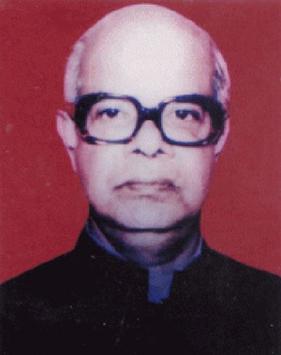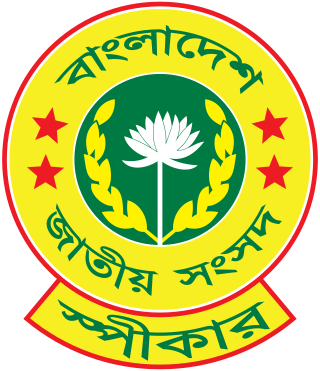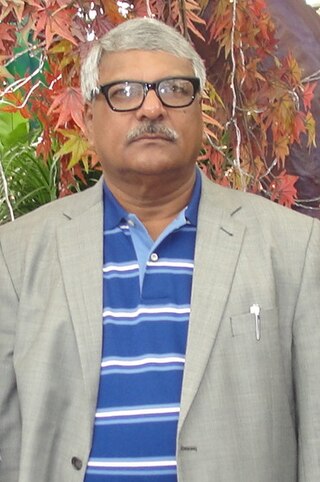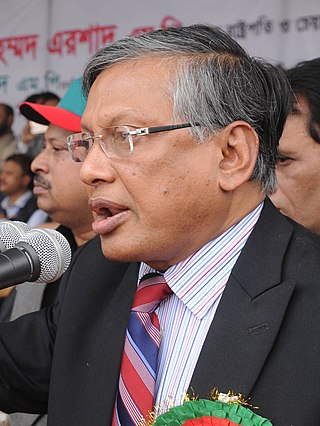
The Jatiya Sangsad, often simply referred to as Sangsad and also known as the House of the Nation, is the supreme legislative body of Bangladesh. The current parliament of Bangladesh contains 350 seats, including 50 seats reserved exclusively for women. Elected occupants are called members of Parliament, or MPs. The 12th national parliamentary election was held on 7 January 2024. Elections to the body are held every five years, unless a parliament is dissolved earlier by the President of Bangladesh. On 6 August 2024, President Mohammed Shahabuddin dissolved parliament after the resignation of Sheikh Hasina and ordered to form an interim government.

General elections were held in Bangladesh on 1 October 2001. The 300 seats of the Jatiya Sangsad were contested by 1,935 candidates representing 54 parties and 484 independents. The elections were the second to be held under the caretaker government concept, introduced in 1996.

Abdul Malek Ukil was the president of Bangladesh Awami League, speaker of parliament, home minister, health minister, a member of parliament for many years and a lawyer of the Supreme Court of Bangladesh. He was one of the drafters of the Constitution of Bangladesh and also one of the founding members of East Bengal Muslim Students League.

The government of the People's Republic of Bangladesh is the central executive government of Bangladesh. The government was constituted by the Constitution of Bangladesh comprising the executive, the legislature, and the judiciary. Bangladesh is a unitary state and the central government has the authority to govern over the entirety of the nation. The seat of the government is located in Dhaka, the capital of Bangladesh.

The Speaker of the Jatiya Sangsad is the presiding officer of the Parliament of Bangladesh. The speaker is elected generally in the first meeting of the parliament following general elections by Members of Parliament. Serving for a term of five years, the speaker chosen from sitting members of the parliament, and is by convention a member of the ruling party or alliance.

Shamsul Hoque Tuku is a Bangladeshi politician from the Awami League party and former deputy speaker of the Jatiya Sangsad. He also served as the Minister of Home Affairs in the Second Hasina ministry.
Muhammad Reazuddin Ahmed, popularly known by his nick name Bhola Mia, was a Bangladeshi politician, lawyer and minister. He was a member of parliament for the then Rangpur-13, then Rangpur-15 and Lalmonirhat-3 constituencies. He was the deputy speaker of the 4th parliament of Bangladesh.

Akhtar Hamid Siddiqui was a Bangladesh Nationalist Party politician who served as the Deputy Speaker of the 8th Jatiya Sangsad. He was elected to the parliament from the Naogaon-3 constituency in four consecutive elections from 1991 to 2001. He was also appointed as an Advisor to BNP Chairperson in 2016.

Md. Fazle Rabbi Miah was a Bangladesh Awami League politician, who served as the deputy speaker of the Jatiya Sangsad and also a member representing the Gaibandha-5 constituency for seven terms. He was a member of the Awami League Central Committee. Before joining Awami League, he won four times as member of parliament from Jatiya Party (Ershad).
Shah Moazzem Hossain was a Bangladesh Nationalist Party politician and the last deputy prime minister of Bangladesh. He was elected as the Jatiya Sangsad member representing the Rangpur-6 constituency as a Jatiya Party candidate in a by-election in September 1991 and served until November 1995.
Mohammed Abdul Matin, popularly known as MA Matin, was a Bangladesh Jatiya Party politician and a deputy prime minister of Bangladesh.

The Leader of the House is responsible for managing and scheduling government business in the Jatiya Sangsad. The office is always held by the Prime Minister of Bangladesh. The leader and deputy leader are elected by a majority of the members of the parliament.

Ziauddin Ahmed Bablu was a Bangladeshi politician of the Jatiya Party and served as the Secretary General for two terms. He was a Jatiya Sangsad member representing the Chittagong-9 constituency at the 10th Jatiya Sangsad and the Chittagong-6 constituency at the 4th Jatiya Sangsad. He served as the Cabinet Minister for Energy during Ershad's regime in the 1980s. He was appointed an advisor to the Prime Minister Sheikh Hasina in November 2013.
Jaya Sengupta is a Bangladesh Awami League politician, doctor, and a former Jatiya Sangsad member representing the Sunamganj-2 constituency. Her husband, Suranjit Sengupta, was a senior leader of the Bangladesh Awami League and a minister of Bangladesh Railway.
Rabia Bhuiyan is a Jatiya Party (Ershad) politician and a former Jatiya Sangsad member from women's reserved seat 19. She is the first female barrister in Bangladesh. She is most notable for founding the law school, Bhuiyan Academy, in Dhaka.
Sirajul Haq is politician of Bangladesh Nationalist Party, veteran of the Mukti Bahini, former member of parliament for the Jamalpur-5 constituency and former deputy minister of health.
Sirajganj-7 was a constituency represented in the Jatiya Sangsad of Bangladesh, which was abolished in 2006.
Manikganj-4 is a defunct constituency represented in the Jatiya Sangsad of Bangladesh abolished in 2006.

A Member of Parliament (MP) in Bangladesh is a member of the unicameral legislature of Bangladesh, the Jatiya Sangsad or House of the Nation. A majority of members are elected directly in general elections, while a minority of seats are reserved exclusively for women and allocated on a proportional basis. The Constitution specifies that Parliament consists of 300 directly elected members, while 50 seats are reserved for women. The individual who leads the largest party or alliance in parliament usually becomes Prime Minister of Bangladesh. The parliament is currently dissolved by order of the President until the next general election due to the result of the protests ousting the current government.









